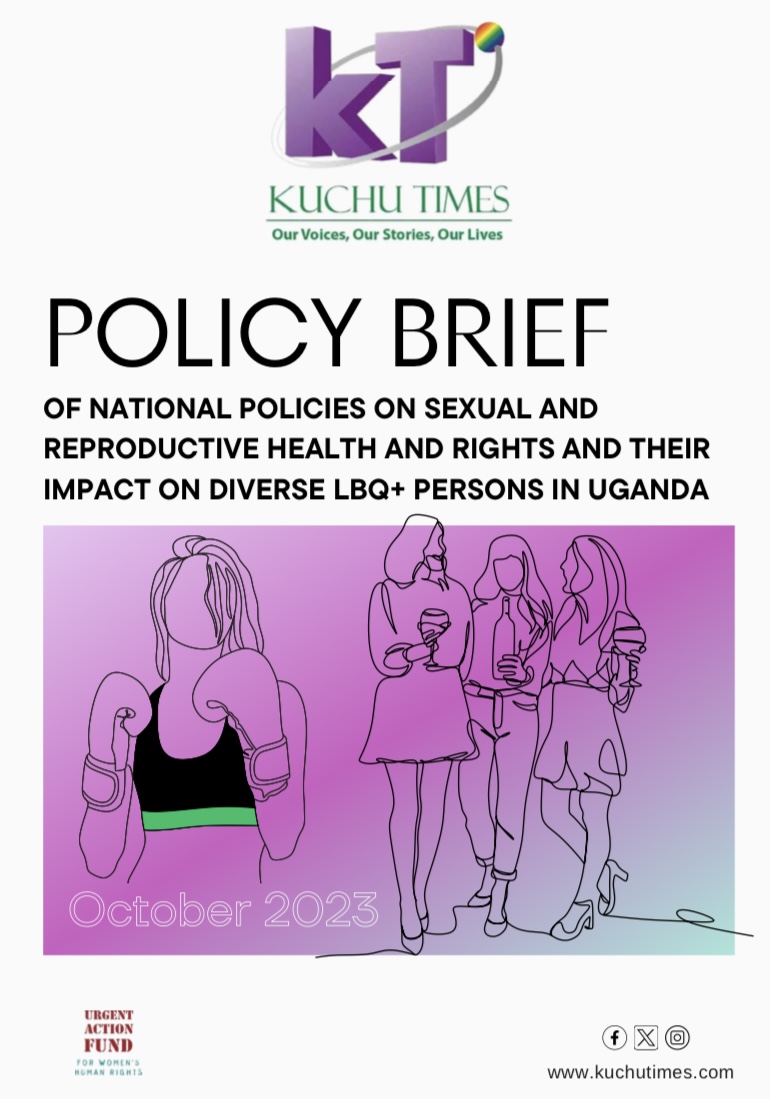Kuchu Times Media Group with support from Urgent Action Fund-Africa conducted a qualitative research on the policies Uganda has in place regarding Sexual Reproductive Health and Rights and how these policies affect LBQT persons in Uganda. As the world gears towards the International Day of Action for Women’s Health on May 28th, it is important to bring these findings back into the limelight as unfortunately LBQT persons remain an underserved demographic. This policy review provides a comprehensive assessment of Uganda’s healthcare policies, revealing significant gaps and barriers that hinder equitable access to healthcare for LBQT+ individuals.
Uganda has, on paper, established various healthcare policies and guidelines related to sexual and reproductive health rights (SRHR) and HIV/AIDS, including the HIV Testing Policy and Guidelines and the National HIV/AIDS Strategic Plan. These policies claim to uphold principles of equity and non-discrimination and, in some cases, acknowledge key population groups, prioritizing them for service provision. However, our research reveals that even within these key population groups, lesbian, bisexual, and queer (LBQ) individuals are not adequately catered for. This oversight is attributed to the apparent lack of data on the SRHR needs of this particular group, highlighting a significant gap in policy formulation and implementation.
Moreover, Uganda’s discriminatory laws worsen the challenges faced by LBQT+ individuals in accessing healthcare services. The Anti-Homosexuality Act, 2023, despite making amendments to clauses around discriminatory health service provision, has failed to repeal the entire law. This failure maintains an environment where sexual and gender diverse persons do not feel safe enough to seek the necessary healthcare services. The persistence of such legal frameworks perpetuates stigma, discrimination, and fear, making access to healthcare a nightmare for LBQT+ individuals. Consequently, our communities continue to suffer from inadequate healthcare, further marginalizing them and impeding their overall well-being.
LBQT+ individuals in Uganda face significant barriers when accessing healthcare services, primarily due to a combination of restrictive laws, discrimination, stigma, and violence. These challenges are especially pronounced in rural areas, where the strong influence of cultural and religious norms on law enforcement exacerbates the difficulties faced by LBQT+ individuals.
Key findings:
Restrictive laws, such as the Anti-Homosexuality Act, criminalize same-sex relationships and other behaviors associated with the LBQT+ community. These laws create a legal environment where LBQT+ individuals are reluctant to seek healthcare services for fear of legal repercussions. The mere existence of such laws legitimizes discrimination and stigmatization, both within healthcare settings and in society at large.
Discrimination within healthcare facilities is a pervasive issue, with many LBQT+ individuals reporting hostile treatment from healthcare providers. This includes refusal of care, verbal harassment, and the breach of confidentiality. Such discriminatory practices deter LBQT+ individuals from accessing the healthcare they need, fearing mistreatment and exposure.
Stigma surrounding non-heteronormative sexual orientations and gender identities further alienates LBQT+ individuals. This stigma is deeply ingrained in many communities, leading to social ostracization and mental health challenges for those affected. The fear of being outed or judged discourages LBQT+ individuals from seeking preventive and routine healthcare services, leading to poorer health outcomes.
Violence, both physical and psychological, is another significant barrier. LBQT+ individuals are at risk of violence from community members, law enforcement, and even family members. This violence can manifest in various forms, from physical assaults to threats and intimidation, creating an environment of constant fear and insecurity.
In rural areas, these barriers are amplified by the strong influence of cultural and religious beliefs that condemn LBQT+ identities. Traditional and religious leaders often reinforce negative attitudes towards LBQT+ individuals, leading to stricter enforcement of discriminatory laws and more pronounced social exclusion. This results in limited access to healthcare services, as healthcare providers in these areas may be more likely to adhere to prevailing cultural and religious norms that oppose LBQT+ identities.
These combined barriers not only limit access to necessary healthcare services but also contribute to a pervasive climate of fear and exclusion. LBQT+ individuals are forced to navigate a hostile environment, which severely limits their ability to receive appropriate and timely healthcare. Addressing these barriers requires comprehensive legal, policy, and societal changes to ensure that LBQT+ individuals can access healthcare services without fear of discrimination, stigma, or violence.
As we observe the International Day of Action for Women’s Health, let us commit to advancing healthcare equity and ensuring that every individual, regardless of their sexual orientation or gender identity, has access to the comprehensive and compassionate care they deserve.




